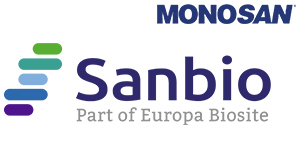Polyclonal Rabbit anti-Lysozyme
Polyclonal Rabbit anti-Lysozyme
SKU
SANPS287
Packaging Unit
1 ml
Manufacturer
Sanbio / Monosan
Availability:
loading...
Price is loading...
Immunogen: Unknown or proprietery to MONOSAN and/or its suppliers
Concentration: 100 ug/ ml
Storage buffer: PBS with 0.1% BSA and 0.02% sodium azide
Additional info: Lysozyme is a 14 kd enzyme directed against the b 1 a 4 glycosidic bond between N-acetylglucosamine and N-acetylmuramic acid residues that make up peptidoglycan. Lysozyme is an antimicrobial protein secreted by polymorphonuclear leukocytes and is widely distributed in secretions such as airway secretions and nasal fluid whereas it is the most effective antimicrobial protein. It is also produced by monocytes, macrophages and epithelial cells. Lysozyme is able to kill bacteria by enzymatic lysis of bacterial cell walls and by a nonenzymatic mechanism. Allthough lysozyme is highly active against many gram-positive bacteria it is ineffective against gram-negative bacteria unless potentiated by certain cofactors (lactoferrin, antibody-complement or hydrogen peroxide-ascorbic acid). Next to its antimicrobial activity lysozyme has many other physiological functions including inactivation of certain viruses, important roles in surveillance of membranes of mammalian cells, immune regulatory activity, anti-inflammatory and antitumor activity
References: Laible; N et al. Infect Immun 1985; 48: 720 /Cole, A et al Infect Immun 1999, 67: 3267 /Ibrahim; H et al. Curr Pharm Des 2002; 8: 671
Concentration: 100 ug/ ml
Storage buffer: PBS with 0.1% BSA and 0.02% sodium azide
Additional info: Lysozyme is a 14 kd enzyme directed against the b 1 a 4 glycosidic bond between N-acetylglucosamine and N-acetylmuramic acid residues that make up peptidoglycan. Lysozyme is an antimicrobial protein secreted by polymorphonuclear leukocytes and is widely distributed in secretions such as airway secretions and nasal fluid whereas it is the most effective antimicrobial protein. It is also produced by monocytes, macrophages and epithelial cells. Lysozyme is able to kill bacteria by enzymatic lysis of bacterial cell walls and by a nonenzymatic mechanism. Allthough lysozyme is highly active against many gram-positive bacteria it is ineffective against gram-negative bacteria unless potentiated by certain cofactors (lactoferrin, antibody-complement or hydrogen peroxide-ascorbic acid). Next to its antimicrobial activity lysozyme has many other physiological functions including inactivation of certain viruses, important roles in surveillance of membranes of mammalian cells, immune regulatory activity, anti-inflammatory and antitumor activity
References: Laible; N et al. Infect Immun 1985; 48: 720 /Cole, A et al Infect Immun 1999, 67: 3267 /Ibrahim; H et al. Curr Pharm Des 2002; 8: 671
| SKU | SANPS287 |
|---|---|
| Manufacturer | Sanbio / Monosan |
| Manufacturer SKU | PS287 |
| Package Unit | 1 ml |
| Quantity Unit | STK |
| Reactivity | Human |
| Clonality | Polyclonal |
| Application | Immunoprecipitation, Western Blotting, ELISA |
| Isotype | Ig |
| Host | Rabbit |
| Conjugate | Unconjugated |
| Product information (PDF) | Download |
| MSDS (PDF) |
|

 Deutsch
Deutsch







